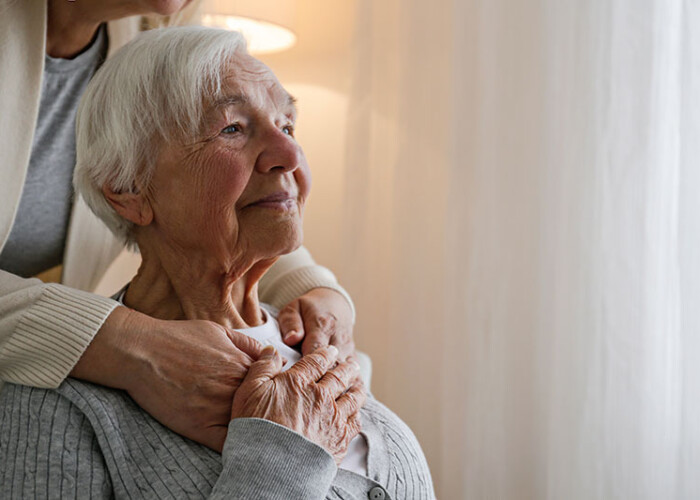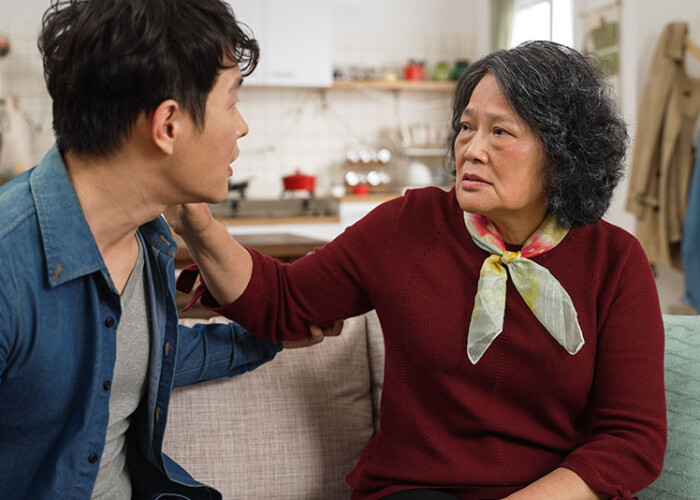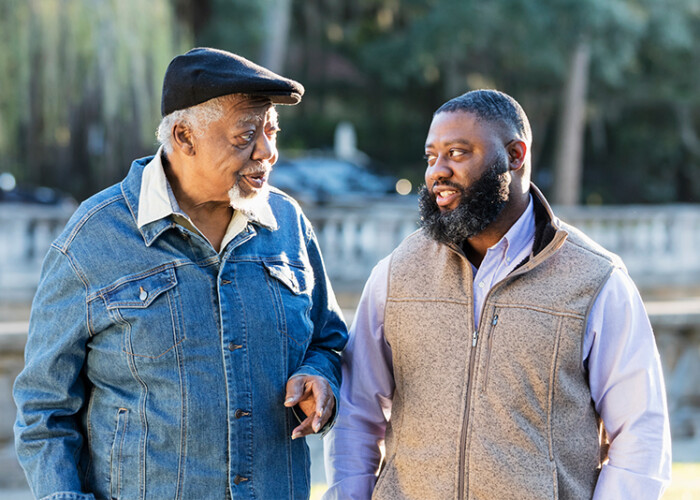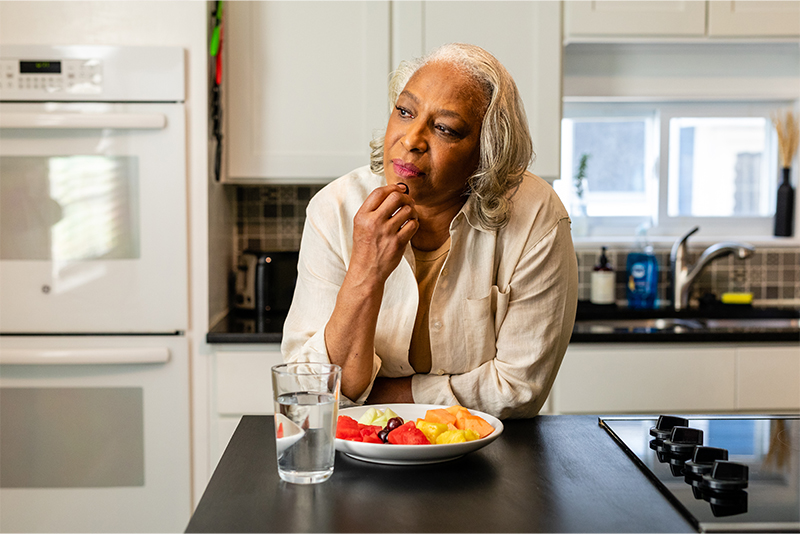Caregiver Support Tip
Read This Before Welcoming a New Caregiver Into the Home!
Welcoming a new caregiver into the home is a much smoother process with these tips.
The big day is here—your dad’s first day with his new caregiver! If your family is feeling a mix of relief, uncertainty, and even a little anxiety, you’re not alone. Welcoming a new caregiver into the home is a big adjustment, not just for the person receiving care, but for the entire family. The good news is that with some preparation, you can help set the stage for a positive, comfortable transition.
Conversation Starters and Tips for Introducing the Idea of Home Care to Your Parents
If introducing the idea of home care to an older loved one feels uncomfortable, try these tips and conversation starters.
If you ever had to have “the talk” with your parents about those awkward pre-teen topics, you might remember how uncomfortable it was. Now, the roles have shifted, and it’s your turn to bring up an equally difficult subject: discussing concerns about their well-being and introducing the idea of home care.
Could You Be Experiencing Caregiver PTSD?
Caregiver PTSD is, surprisingly, the most common form of post-traumatic stress disorder.
When you think of PTSD (post-traumatic stress disorder), your mind might conjure images of soldiers returning from battle or individuals who’ve faced extreme life-threatening events. While PTSD is certainly linked to those experiences, it isn’t confined to them. In fact, PTSD can develop after any deeply distressing event—including providing care for a family member. Surprising, isn’t it? Caregiver PTSD is a significant yet often overlooked issue, as the focus is typically placed on the person receiving care rather than the caregiver’s emotional and mental health.
Yes, There’s Help for Chronic Fatigue in Older Adults
Learn how to recognize and better manage chronic fatigue in older adults.
Some mornings, the snooze button is your best friend—offering a few extra precious moments of rest. But for many older adults, fatigue is more than just morning grogginess; it’s an all-encompassing exhaustion that seeps into every part of their day. As one chronic fatigue sufferer vividly described, “I feel like my battery is permanently drained. It’s as if I’m a dish rag that’s been wrung out and left with nothing to give.”
Recognizing and Resolving Senior Anxiety
If you suspect senior anxiety in someone you love, help is available.
Does an older adult you care about seem more withdrawn, restless, or forgetful than usual? While these changes may appear to be part of aging, they might actually indicate something deeper: senior anxiety.
Anxiety is more than just occasional worry or stress. In older adults, it can manifest in subtle or unexpected ways, including:
Persistent, obsessive thoughts
Recurrent nightmares that disrupt sleep
Repetitive behaviors, like checking and re-checking that appliances are off
Physical symptoms, such as sweating, dizziness, or a racing heart
Overreactions to otherwise manageable stressors
What Contributes to Anxiety in Aging Adults?
Aging brings unique challenges that may contribute to anxiety, including:
Side effects from medications
Chronic illnesses or reduced mobility
Grieving the loss of a loved one
Concerns about declining independence or financial stability
Unresolved childhood trauma
These factors, combined with changes in … Read More »
Six Rs to Improve Dementia Care
Use these six essential tips to improve dementia care for someone you love.
Caring for someone with dementia is one of the most meaningful yet challenging roles you can take on. It’s important to remind yourself regularly: You are doing your best. You are making a difference. A little self-affirmation goes a long way, but there’s more to consider when caregiving gets tough. Enter the Six Rs of dementia care—a framework designed to help improve dementia care and better manage the complexities of the disease.
What Are the Six Rs of Dementia Care?
The Six Rs offer a practical, compassionate approach to navigating difficult dementia-related behaviors. By following these steps, you can create a more peaceful, supportive environment:
Reassure
Dementia can make familiar routines and environments suddenly feel intimidating or strange. Loud noises, changes in lighting, unfamiliar visitors, or even … Read More »
The Checklist You Need After the Death of a Loved One
This checklist will help guide you through necessary steps after the death of a loved one.
After the death of a loved one, the grief can be all-encompassing, and the last thing you may feel ready to tackle is a series of responsibilities and tasks. Yet these steps are necessary to honor their memory, ensure their wishes are carried out, and settle their affairs. While the process may seem overwhelming, breaking it down into smaller, manageable actions can make it more bearable.
We’ve created a detailed guide to help you through this difficult time.
Immediate Actions
Obtain the Legal Pronouncement of Death: When a loved one passes away in a hospital or nursing home, the staff will automatically take care of this step. However, if the death occurs at home, call 911 to arrange transportation to the hospital where … Read More »
How to Handle Loss of Recognition in Dementia
Loss of recognition in dementia is never easy to accept, but these tips will help.
You’ve been caring for your mom since her dementia diagnosis, doing your best to manage the ups and downs of the disease. One day, she looks at you with a blank stare or calls you by the name of someone else—a sibling, her spouse, or even her own parent. The sting of the loss of recognition in dementia is overwhelming. Should you correct her? Ignore it? Or embrace the new role she’s assigned you?
Recognition loss is one of dementia’s most heartbreaking effects. Watching someone you love struggle to connect the dots of who you are is never easy. However, how you respond in these moments can shape the interaction and bring peace to the person you love.
How to Respond to Recognition … Read More »
How to Be There for a Senior During a Temporary Assisted Living Stay
A temporary assisted living stay can be less overwhelming and more comfortable with these tips.
After a hospitalization or surgical procedure, the doctor may recommend a temporary assisted living stay before the person returns home. This is typically a short-term time of intensive therapy to promote healing and recovery. However, the thought of moving into a nursing home or assisted living facility even for a matter of weeks or months can be extremely difficult to accept.
Parkinson’s Communication Tips to Help You Stay Connected
Try these Parkinson’s communication tips to enhance your ability to connect with someone you love.
Imagine trying to share your thoughts, feelings, or even a simple idea with someone you love, only to feel as though your words are getting lost. Now, consider how isolating it must be if this were an everyday struggle. For someone living with Parkinson’s disease, this is often the reality. Communication becomes increasingly difficult as the disease progresses, creating frustration and emotional strain for both the person with Parkinson’s and their loved ones, making it crucial to know effective Parkinson’s communication tips. It begins with understanding how communication can be affected by the disease.

















